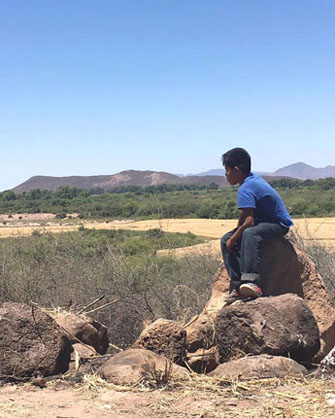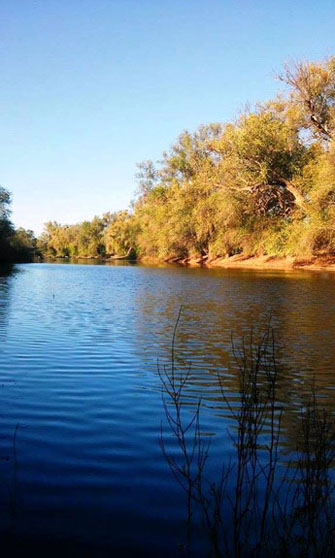Community makes the difference

Yaqui child looks out over his territory from Mt. Abaskauri de Tórim. (Photo: Raquel Padilla).
CIUDAD OBREGÓN
Stretching across large sections of the Yaqui territory are high-tension power lines installed by the Federal Electric Commission, oil and gas ducts belonging to Petróleos de México, fiber optic phone cables from Telmex, railroad tracks, and federal toll highway 15.
There is even an unfinished oil pipeline currently being delayed thanks to the tenacious courage and foresight of the residents of Loma de Bácum, who have refused to sign the final authorization allowing it to cross through their jurisdiction.
Regardless of which private or government company owns or operates them, they generate millions of dollars each day, of which the Yaqui Nation receives not a cent in compensation for the use of their lands.
For at least the last two decades drinking water has been extracted from underground aquifers on Yaqui land and then pumped through the Yaqui-Guaymas Aqueduct, crossing the territory to supply water to the cities of Empalme, Guaymas, and San Carlos. The government charges the residents of these cities for the Yaqui water but the Yaqui see none of these proceeds. Bait and switch tactics have been used by developers and governments alike, in which investment and development agreements have been signed with the Yaqui Tribal Authority, yet none of these have ever been realized.
In more recent times, the Sonoran state government has attacked the Yaqui Nation utilizing what Dr. José Luís Moreno, researcher at Sonora College, has called "institutional dispossession" in order to divert water from the Yaqui River through construction and operation of the Independence Aqueduct. This is a project that National Action Party Gov. Guillermo Padrés' Administration initiated, and the Revolutionary Institutional Party's 's Claudia Pavlovich promotes, in spite of campaign promises to the contrary.
This aqueduct siphons off millions of gallons of Yaqui water, which is diverted first to the Plutarco Elias Calles Dam, known as El Novillo. Yaqui River water ultimately ends up in both Hermosillo's industrial zone and new real estate developments on its outskirts. Faced with these nonstop onslaughts, it is essential that the Yaqui are cognizant of their rights and know how to exercise them.
I have been fortunate to have the pleasure of participating as an instructor in courses and in meetings that both analyze indigenous rights and present expert opinions on indigenous heritage. For example, several months ago the National Institute of Anthropology and History (INAH) along with the National Coordinating Committee of Anthropology, and the Sonora INAH Regional Center, held a three-day course on these topics at the Technological Institute of Sonora in Ciudad Obregón aimed at members of indigenous communities in Sonora and their support networks.
INAH chose to hold the course in the municipality of Cajeme because the majority of the state's indigenous population is located in the southern part of Sonora. Attendees were mainly Yaquis and Mayos, all of them cultural spokespeople, but also present were a doctoral student from the University of Helsinki, and an indigenous rights activist working with Baja California tribes.

The Río Yaqui, in Vícam, is named after the territory's indigenous people who are resisting colonization. (Photo: Félix Espinoza).
The course was taught by Dr. Francisco López Bárcenas, consultant on indigenous cultures for the National Anthropology Coordinating Committee. Both Dr. José Luís Moctezuma from the Sonora INAH Regional Center and I provided teaching assistance. López Bárcenas began the course by asking the audience: "Do you believe you are part of a colonized nation?" The audience answered with an unequivocal "NO!"
Later, I gave a presentation on the history of indigenous resistance in Sonora. José Luis Moctezuma followed, addressing the right of original peoples to have a cultural identity and to speak their own language. Next, López Bárcenas discussed indigenous rights in general, emphasizing the difference between individual and collective rights.
The course broadly addressed the topics of autonomy and indigenous territories, while delving deeply into the fundamental right to the referendum (or plebescite) process. The audience was noticeably interested, posing intelligent questions and offering thoughtful comments. There was, above all, a comfortable and respectful atmosphere that permitted both the facilitators and the public to feel free to express themselves.
By the end of the course, the indigenous participants had come to understand that their rights rest on the strength of their collectives, which consequently give them the ability to exercise autonomy. This includes: self affirmation, or the right to proclaim that they exist as a nation; self-definition, or the right to determine who is part of their community; self-limitation, which is the right to determine the geographical and cultural boundaries of their territory; and self-organization, which implies that they can organize themselves in the manner that best suits them in accordance with their norms and customs.
Based on their own personal experiences as indigenous people as well as on what the speakers had addressed, the attendees confirmed that the referendum process was not properly carried out in regards to the large-scale infrastructure projects that have been recently built, or are under construction in their territory. This led to their realization that they are suffering from a slow colonization process which could easily speed up at any moment. Finally they could see that only in community, fighting against their condition as "indigenous people" will they be able to maintain their territory’s integrity and natural resources for the stability and persistence of their ancestral cultures.
